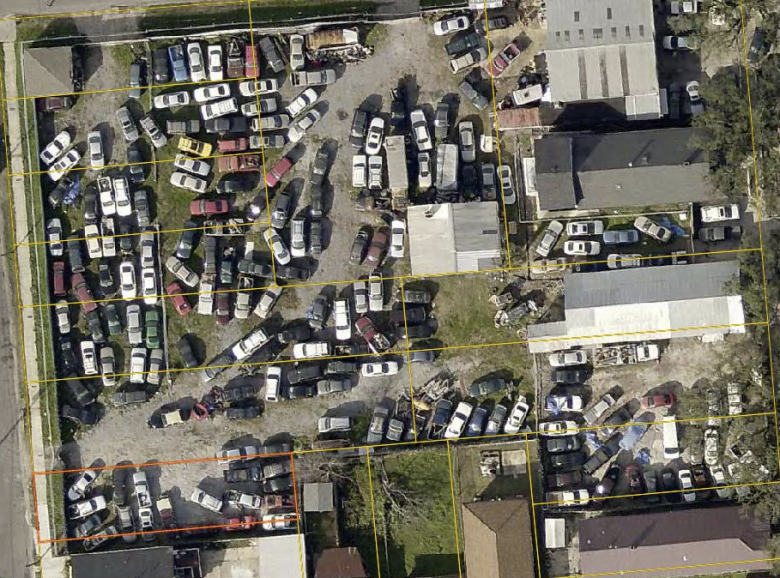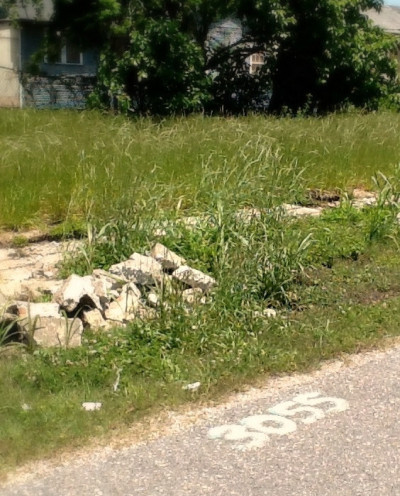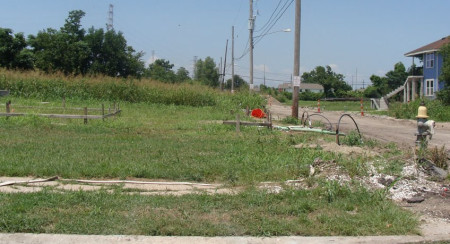
Without informing the public or even the City Council, the New Orleans Redevelopment Authority has expanded a program to unload Road Home properties, offering them exclusively to nearby commercial property owners.
The result is a kind of creeping intrusion of businesses into residential neighborhoods. Broken-down cars now sprawl where a house once stood; parking lots have been dropped into neighborhoods that were once uniformly residential; a house near the New Orleans Country Club looks out on a chain-link fence topped with barbed wire.
With one exception, all this has happened without the zoning changes that are supposed to precede conversion of residential property to commercial.
And the program itself, obtusely named “Near Miss,” hasn’t been vetted by the City Council, which approved the original rules to sell Road Home properties to nearby homeowners.
First, a little history:
The New Orleans Redevelopment Authority came up with the Lot Next Door program as a way to sell properties damaged by Hurricane Katrina and dumped in the city’s lap by the state’s Road Home program.
Under the rules of Lot Next Door, residential property owners who had homestead exemptions — meaning they lived there — could expand their yard by buying a next-door lot on the same street.
“It never occurred to me that commercial or other non-residential entities were even a possibility.” —Lou Volz, former member of City Planning Commission
In February 2010, under then-director Joyce Wilkerson, the Redevelopment Authority board changed the rules to allow companies, churches, nonprofit organizations and residential property owners without a homestead exemption to buy next-door lots. This part of the program was called Near Miss — for the people who had just missed being eligible for Lot Next Door.
Jump ahead to a hearing this past February at which the Redevelopment Authority presented to the City Council a plan to loosen the rules to buy property. Among other things, the new rules would allow residential property owners to acquire adjacent properties that weren’t on the same street — back lots, for instance. The amendments were presented as the program’s first expansion. No one mentioned that commercial property owners already could buy these properties under more generous rules.
The Lens’ Karen Gadbois talks with WWNO’s Eve Troeh about how this program has affected property use
After the council meeting, The Lens asked Councilwomen Stacy Head and Kristin Gisleson Palmer if they had ever heard of the Near Miss program. They hadn’t, and they were dismayed to learn that the council had been working with the Redevelopment Authority for months to expand the Lot Next Door program when the authority already had done so on its own.
Changing the rules without the council’s input “makes the legislative act meaningless,” Head said.
Lou Volz, who was on the Planning Commission when the Redevelopment Authority created the Near Miss program, said he never knew commercial property owners could buy Road Home properties. “It never occurred to me that commercial or other non-residential entities were even a possibility,” he said via email.
Even now, the Near Miss program is mentioned nowhere on the Redevelopment Authority website. A city news release outlining the recent expansion of the Lot Next Door Program doesn’t note that commercial property owners have been able to buy these properties for a few years.
59 properties around the city have been been sold under the Near Miss program.
After establishing Near Miss, the Redevelopment Authority sent letters to business owners telling them that a nearby property was available. The letters set the sale price and described eligibility requirements.
Since April 2010, 59 properties in the city have been sold to 58 non-residential purchasers through the Near Miss program.
Among the first to take advantage of the program were Free Mission Baptist Church in the Lower 9th Ward, Affordable Trucking in Gentilly and Rock ‘n’ Bowl on Carrollton Avenue.
In Rock ‘n’ Bowl’s case, the price paid through Near Miss was substantially less than similar properties bought nearby. In 2009, a company owned by Rock ‘n’ Bowl’s John Blancher purchased two lots on Fig Street across from the music venue. One cost $25,000, the other $30,000.
In March 2010, the same firm bought another lot on Fig. The price: $16,000, set by the Redevelopment Authority. Blancher told The Lens that he did get the Near Miss property for less than the nearby lots, but he noted that the price was based on an independent appraisal.
Lots sold, but not rezoned
On paper, at least, the Near Miss program restricts use of the acquired property to “a manner consistent with city zoning code.”
The reality has been a bit messier.
Some of the formerly residential lots have been used for parking lots, junkyards and an auto body paint shop. In one case, a country club set up a short-game practice area.

Just one of those 59 properties has gone through the permitting and rezoning process to legalize how the property is being used. The exception is the New Orleans Country Club, which received permission to subdivide the residential property.
The upshot: Many Near Miss properties are being used in ways that do not conform to the city zoning maps. Or they’re left vacant and overgrown, contributing to the blight that plagues some neighborhoods. Or both.
In December, George Amedee, who at the time was a member of the City Planning Commission, applied on behalf of his church to buy a lot on North Villere Street. New Light Baptist Church paid $5,000 for the property, which it planned to use for a parking lot.
The lot purchased through Near Miss is overgrown and littered. The church hasn’t applied for a zoning change to follow through on its plan to create a parking lot. It uses a neighboring lot for parking, though that hasn’t been approved by the city.
Efforts to contact Amedee and the Rev. Gregory Davis, New Light’s pastor, were unsuccessful.
Good Time Sushi on Elysian Fields Avenue has been using a Near Miss property for a parking lot. With no curb cut to access the patchwork of asphalt, people drive over the sidewalk.
The restaurant applied to have the property rezoned two years ago, shortly after buying it for $20,000, but the application is still pending.
Emails and phone calls to the owners were not returned.
Another high-profile recipient of a Near Miss property was the Ninth Ward Housing Development Corporation, a nonprofit organization associated with Jon Johnson, the incarcerated former City Council member.

An associate of Johnson sought permission to buy the lot at 2200 Deslonde St. in March 2011, two months after The Lens exposed the severely blighted condition of the nonprofit’s buildings. Near Miss regulations disqualify applicants who have been cited for blight or other code violations.
The nonprofit purchased the lot a couple months later for $4,000. The organization said it hoped to get government grants to build a house.
The Deslonde Street property was subsequently cited for blight in August 2011. The property is still vacant, but it’s properly maintained.
The increased commercialization and continued blight hasn’t caused an outcry from Near Miss neighbors, however. Many of these lots are in parts of the city where blight is a less-pressing concern than violent crime. Considering that the Redevelopment Authority did not publicize the Near Miss program, neighbors may not have known that nearby businesses could buy those properties.
Nonresidential uses expand in neighborhoods
Perry Courseault, owner of CMS Auto Repair and Towing on Elysian Fields Avenue, bought two lots in 2011, one for $6,000 and another for $7,500.
His company’s original property is zoned L1, Light Industrial; the two lots he bought are RD-3, a residential classification, and B1, which is used for neighborhood shops.
[module align=”right” width=”half” type=”pull-quote”]“You have to be really careful” when expanding commercial property in residential areas. —Kristin Gisleson Palmer[/module]Under the old Lot Next Door rules, homeowners whose property backed up to those lots were not eligible to buy them. Under the new regulations, they can.
Courseault went on to expand his storage lot onto the two new properties, moving his business closer to the remaining residential properties in the same block. Calls to Courseault were not returned.
Gisleson Palmer, who has long advocated getting Road Home properties into private hands more quickly and efficiently, said she worries that the Near Miss program endangers the balance between residential and commercial uses in a neighborhood.
“This change to allow for commercial entities to acquire properties may exacerbate the situation,” she said. “You have to be really careful.”
In June 2012 the New Orleans Country Club received a letter from the Redevelopment Authority. It said the country club was eligible to purchase the lot at 9111 Peach St. in the Dixon neighborhood, which backs up to the country club.
After buying the lot for $7,500, the country club has expanded into the neighborhood. Residents now look out on a chain-link fence with barbed wire. The Lens was not able to reach anyone with the country club to comment.
An end to the program?
Brenda Breaux, the Redevelopment Authority’s chief operating officer, said she is “not certain what the thinking was” with the Near Miss program, which was set up before Mayor Mitch Landrieu took office.
The program remained active after Jeff Hebert succeeded Wilkerson as executive director in January 2012.
The Redevelopment Authority is handling applications to transfer two more properties under the Near Miss program, Breaux said. One is a townhouse in eastern New Orleans; the other, on Derbigny Street in the 7th Ward, is being sold to Urban Impact Ministries.
Once those two lots are sold, the agency plans to shut down Near Miss, she said.
Breaux also stressed that the Redevelopment Authority is in the midst of an audit of “everything sold by NORA, including pre-Katrina sales.” That audit is supposed to be finished this month.
The sales agreements require purchasers to maintain the property, and they give each owner nine months to make “substantial progress” on any construction or rehabilitation. If a property owner doesn’t comply, the Redevelopment Authority could sue to get the property back. The purchaser would lose the money it paid and anything it had put into the property.
Breaux said the Redevelopment Authority is “prepared to go to court” to enforce those terms.

